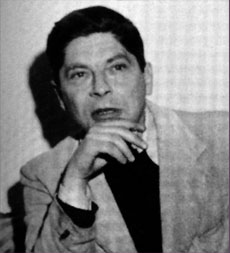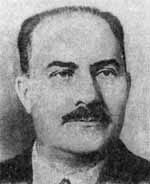Francis Fukuyama (again): Don't shoot! I'm not a neocon

Francis Fukuyama: When we was necons

Arthur Koestler: When we was commies

Robert Kagan the Leninist

Lazar Kaganovich the Stalinist
By now you all know that Francis ("The End of History") Fukuyama has filed for divroce from the Kristol/Podhoretz clans. In quite a number of speeches, articles (for example) and newsbites he has made it clear to all the interested parties (including potential employers like Presidents Hillary Clinton and John McCain) that he ain't a neocon, well, not a neocon like Bill Kristol and Robert Kagan, and that he now considers himself now to be what? A "reformed neocon?" A "neo-neocon?" A "neocon-Lite?" In his latest "I'm-not-a-neocon" manifesto in the New York Times, "After Neoconservatism" FF describes himself as a proponent of "realistic Wilsonianism." And in the essay (thankfully not as long as "The End of History) he does quite a lot of brilliant dialectial thinking in explaining why he, Francis Fukuyama, is still riding on the Waves of History while blasting his former allies in the "movement." And it's very nasty:
I have numerous affiliations with the different strands of the neoconservative movement. I was a student of Strauss's protégé Allan Bloom, who wrote the bestseller "The Closing of the American Mind"; worked at Rand and with Wohlstetter on Persian Gulf issues; and worked also on two occasions for Wolfowitz. Many people have also interpreted my book "The End of History and the Last Man" (1992) as a neoconservative tract, one that argued in favor of the view that there is a universal hunger for liberty in all people that will inevitably lead them to liberal democracy, and that we are living in the midst of an accelerating, transnational movement in favor of that liberal democracy. This is a misreading of the argument. "The End of History" is in the end an argument about modernization. What is initially universal is not the desire for liberal democracy but rather the desire to live in a modern — that is, technologically advanced and prosperous — society, which, if satisfied, tends to drive demands for political participation. Liberal democracy is one of the byproducts of this modernization process, something that becomes a universal aspiration only in the course of historical time.
"The End of History," in other words, presented a kind of Marxist argument for the existence of a long-term process of social evolution, but one that terminates in liberal democracy rather than communism. In the formulation of the scholar Ken Jowitt, the neoconservative position articulated by people like Kristol and Kagan was, by contrast, Leninist [Ouch!]; they believed that history can be pushed along with the right application of power and will. Leninism was a tragedy in its Bolshevik version [Ouch! Ouch!], and it has returned as farce [Ouch! Ouch! Ouch!]when practiced by the United States. Neoconservatism, as both a political symbol and a body of thought, has evolved into something I can no longer support. [Oh My Hegel!]
What FF is basically arguing is (and here I'm borrowing from another political philosopher, Bill Maher), is that the neocons were using a great film script (which Fukuyama helped to write), but that they just did a lousy job in directing and producing the movie on Iraq. And now the danger is that studios in Washington, DC, (future White Houses) are now going to use the script knowing fully well they won't be able to attract a large audience (the American people):
But it is the idealistic effort to use American power to promote democracy and human rights abroad that may suffer the greatest setback. Perceived failure in Iraq has restored the authority of foreign policy "realists" in the tradition of Henry Kissinger [those evil guys]. Already there is a host of books and articles decrying America's naïve Wilsonianism and attacking the notion of trying to democratize the world [And we can't allow that to happen]. The administration's second-term efforts to push for greater Middle Eastern democracy, introduced with the soaring rhetoric of Bush's second Inaugural Address, have borne very problematic [Yeah.. "problematic"]fruits. The Islamist Muslim Brotherhood made a strong showing in Egypt's parliamentary elections in November and December. While the holding of elections in Iraq this past December was an achievement in itself, the vote led to the ascendance of a Shiite bloc with close ties to Iran (following on the election of the conservative Mahmoud Ahmadinejad as president of Iran in June). But the clincher was the decisive Hamas victory in the Palestinian election last month, which brought to power a movement overtly dedicated to the destruction of Israel. In his second inaugural, Bush said that "America's vital interests and our deepest beliefs are now one," but the charge will be made with increasing frequency that the Bush administration made a big mistake when it stirred the pot [like invading Iraq?], and that the United States would have done better to stick by its traditional authoritarian friends in the Middle East [now... isn't the Bush Administration's sticking by the Saudis?]. Indeed, the effort to promote democracy around the world has been attacked as an illegitimate activity both by people on the left like Jeffrey Sachs and by traditional conservatives like Pat Buchanan [those crazy, crazy guys].
The reaction against democracy promotion and an activist foreign policy may not end there. Those whom Walter Russell Mead labels Jacksonian conservatives — red-state Americans whose sons and daughters are fighting and dying in the Middle East — supported the Iraq war because they believed that their children were fighting to defend the United States against nuclear terrorism, not to promote democracy. They don't want to abandon the president in the middle of a vicious war, but down the road the perceived failure of the Iraq intervention may push them to favor a more isolationist foreign policy [here we go again...fighting to defend the U.S. against nuclear terrrorism but not wanting to get killed so as to allow Shiite clerics to come to power in Iraq is "isolationism..."], w hich is a more natural political position for them [because they are... stupid?]. A recent Pew poll indicates a swing in public opinion toward isolationism; the percentage of Americans saying that the United States "should mind its own business" has never been higher since the end of the Vietnam War [can you believe that?].
More than any other group, it was the neoconservatives both inside and outside the Bush administration who pushed for democratizing Iraq and the broader Middle East. They are widely credited (or blamed) for being the decisive voices promoting regime change in Iraq, and yet it is their idealistic agenda that in the coming months and years will be the most directly threatened. Were the United States to retreat from the world stage, following a drawdown in Iraq, it would in my view be a huge tragedy, because American power and influence have been critical to the maintenance of an open and increasingly democratic order around the world. The problem with neoconservatism's agenda lies not in its ends, which are as American as apple pie,[son, when you'll grow up, you could also be fighting to bring democracy to the Middle East] but rather in the overmilitarized means by which it has sought to accomplish them. What American foreign policy needs is not a return to a narrow and cynical realism, but rather the formulation of a "realistic Wilsonianism" that better matches means to ends.
FF's intellectual acrobatics are very entertaining. It makes you almost forget that he was one of those who signed in 1998 a letter to President Clinton in which he called on the Washington to "undertake military action" to help "removing Saddam Hussein and his regime from power." And guess who is on the steering committee for the Scooter Libby Legal Defense Trust?
But I must say that it's a lot of fun to follow all the in/out fighting among the many neocon sects. It's starting to look more and more like the good old days of the late 1940's and 1950's when leading intellectuals like Arthur Koestler declared their own divroce with the communist movement. Koestler and the other ex-commies had more sex-appeal than Fukuyama and the other ex-neocons. And unlike these guys, Koestler and his colleagues were not chicken-hawks. They actually did fight in the Spanish Civil War and other armed conflicts and didn't send other people to die there.
In any case, for those who are interested, FF and the neo-neocons even have now their own magazine, The American Interest. And btw, the American Interest's website has a link to a debate between AI Global Advisory Council member Bernard-Henri with Weekly Standard founder and editor William Kristol, moderated by AI Editorial Board Chair Francis Fukuyama. Wow.. Now that's really something very exciting.
Comments